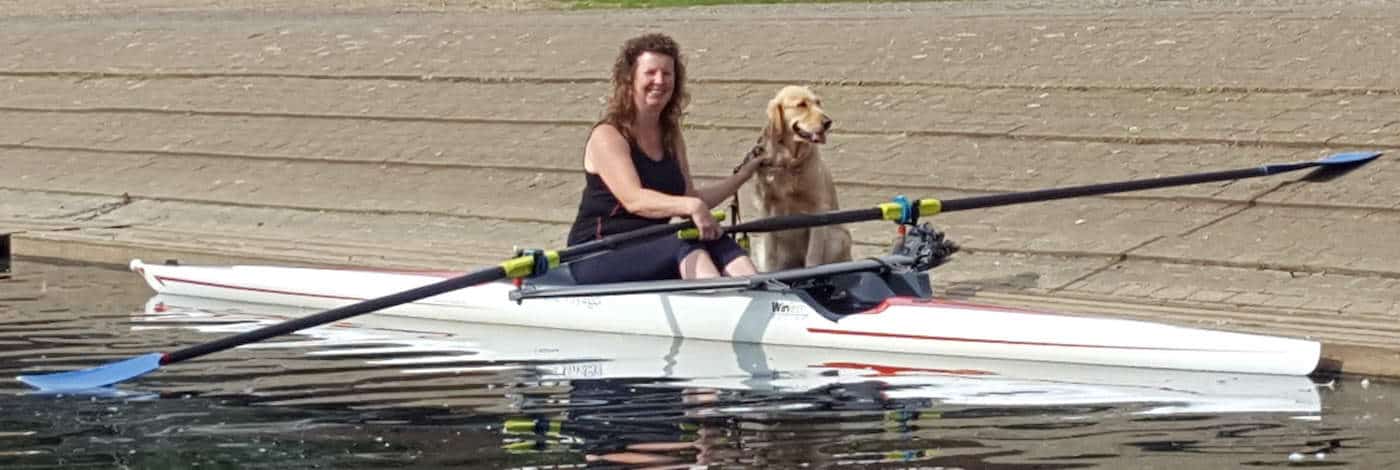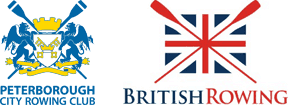Rowing Blind…..the story of Kathryn Lindgren

Kathryn (Kate) Lindgren is a member of Peterborough City Rowing Club and has found a new sense of freedom and independence as a blind rower.
Kate started to lose her sight in her late teens due to a condition called Retinitis Pigmentosa; this is a deteriorating condition which has no cure. Kate now only has some light perception, but once she is in the boat this does not affect her ability to row. In fact, Kate has now progressed to rowing by herself in a single rowing scull.
This is what Kate had to say about her rowing experience….
“People have often asked me in the last 15 months why I decided to take up rowing. The idea was put in my head 20 years ago when I finished my degree and was looking for an activity. Unfortunately, due to family responsibilities and I suppose lack of confidence I took the idea no further. Then just after my 50th birthday and having suffered from feelings of claustrophobia the idea of rowing returned. One afternoon while out walking along the river with my daughter and guide dog, a rowing boat passed by with 8 rowers, all older than myself. I wanted an activity which took place outdoors and hopefully all year round; little did I know then what I was letting myself in for!
I contacted the club to see if they were happy to teach a blind person and one morning, I ended up at the club by myself and for the first time in many years minus a trusty guide dog or human guide. The group were so friendly and encouraging and the coaches made the experience of rowing fun and comfortable. I should add here that I am not a sporty person so anything too strenuous was not for me! However, you can learn at your own pace and to whatever fitness level you have. From going out in a double with a coach I learnt to master (still trying) the technique of sculling which involves two oars (or blades as those who are in the know call them).
Friends would see my posts on facebook and they all say that when they ask ‘how it’s going’ that my face lights up with a huge grin. I have since rowed in quads (4 people with a cox), an eight (just one blade each like the Boat Race); but everyone wanted to figure out how to get me in a single by myself. Well, today I completed my fourth session in a single with my coach on the bank giving me instructions for navigation. We both have a mobile phone with a Bluetooth headset; although mine uses bone conduction technology. I can still hear all that is around me as the headset sits on my cheekbones and not in my ears.
I love the sense of freedom and independence I get from being in a single. It gives me the ability to focus on my rowing stroke and although I enjoy rowing in a crew it is the difference between working as a team and being solely reliant on myself to balance the boat and make it move through the water. The sound of the water running under the boat is just so pleasing and the feeling of the weather all around me makes me appreciate that life is fantastic. I am not the type of person to be competitive, but I like to set myself a goal or challenge. Now that I can get out in a single with the help and encouragement of great coaching from the bankside, I want to learn to row a fast kilometer. I started today with 6mins 10sec and hope to improve on this time as I develop my technique. I feel that even though I don’t push myself physically that my fitness levels have increased since I started. I feel rowing is a great sport for people of all ages, abilities and disabilities as it is low impact and can be adapted to an individual’s needs.
I have found in recent years that having people around who support and encourage me has increased my confidence to be able to take up new challenges. I have met some wonderful people at the Rowing Club and everyone is willing to help each other get on and off the water.”
The benefits of rowing without sight
If you’ve never set foot in a rowing boat, it may surprise you to hear that rowing is a sport that lends itself quite naturally to adapt to individuals who are blind and visually impaired. Ironically, sighted rowers, especially those rowing in crews of fours or eights, are very familiar with the benefits of rowing without sight. In fact, one of the most productive exercises on rowing teams is called, “Eyes-Closed Rowing.” So, there are many benefits from rowing and you don’t need your vision to row well. If fact, the crew can just focus on their rowing and block out any visual distractions. The rowers can just listen to the sound of the blades as they pierce the water; just feel the flow of the water underneath the boat, feel the momentum of the crew and just sense the freedom and independence of rowing.

